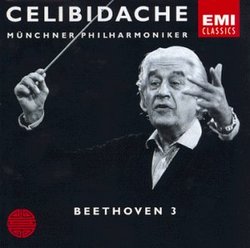Do hear this performance!
09/21/1999
(5 out of 5 stars)
"One thing is certain> no one but Celibidache could have conducted this. The speeds are slow, no "Allegro con Brio" here, but they have their own inner logic, and somehow manage to work. My own preference in Beethoven is for period practice recordings. I love the no nonsense recordings of Frans Bruggen and Jordi Savall, which manage better than most, to bear the score before you. Celibidache belongs to another world and another era. It would be impossible to guess what Beethoven would have made of this, but it's deffinitely worth hearing. As a complement, I would recommend one of the two recordings cited above. They are so different to Celi's that we are almost talking of 2 different works."
A self-organic world
M. Zhao | Los Angeles,CA, USA | 09/16/2009
(5 out of 5 stars)
"sorry for the complex and confusing title, but I really don't know what else I can use to express my experience when hear it. Before listenning to this particular one, there are more than a dozen recordings of this symphony in my collection, which inculde the most magnificent one by Furtwangler's "Urania", Fricsay's live recording in the Great Conductors of the 20th century series, Klemperer's mono recording, etc... All those above more or less share the same values and languages in the world of Beethoven's music, although the result and impression is very different. Furt for me still remains the greatest Beethoven conductor above all.
Here comes Celibidache, an explorer, an revealer, an betrayer, for whom music cannot be interpretated because it already established and fullfilled its own world. As an conductor and performer, the only thing to do is find out the way to the essence,understand it and reveal to the world of matter. In Celi's view, to play the music through a performer's own feeling is a crime for the sake of music. It's like everybody has their own attitude about the Sistine Chapel, such as magnificent, sublime, holy and etc, surely it's no problem to describe in this way, but the Chapel itself has nothing to do with all those describtions. All those adjective words are only about how we thought and feel, on the other hand, what is the real meaning and essence of the Chapel? We don't know it yet.
Celi, as an believer and practicer of both phenomenology and Zen Buddhism, knows the relationship between an observer and the subject he/she observes. For him, the correct meaning of one thing can only be observed and revealed when the observer himself break through the abstacles the self-ego create. For an example, two sides of a war can only understand each other when they abandon the emotions and prejudices, such as hatred and love. In the issue of this particular symphony, what's the relationship between all the notes, tempo markings, dynamics and the whole piece? Someone saw Napolean in the first movement, others feel the victory of the battle in the last movement, somebody said the 1st movement is only allegro con brio... But what all those personal interpretaions mean to the symphony itself? The symphony is nothing, but it is everything! (The sentence of course is in a paradox, according to the dualism and most of the worldviews the modern people has.)
Celibidache is the only one to see, because he see through the self-ego barriers. But is that means the result he saw is also the only one? No! The only cerntain thing is the uncerntainty, even the essence of the world, the life and the symphony. In the style of the Zen Buddhism, we can say at the point where the observer has nothing to really observe, and the obserser himself is no longer an observer, the essence can be revealed.
"


 Track Listings (5) - Disc #1
Track Listings (5) - Disc #1